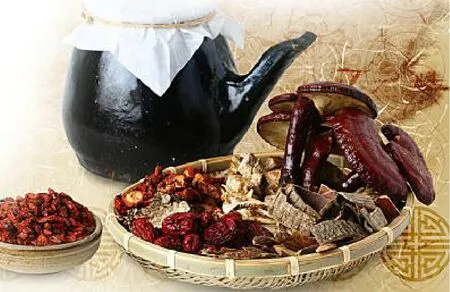“Tasting a Hundred Herbs”
Emperor Yan,or Shennong,is said to be the father of traditional Chinese medicine (TCM).According to Sima Qian’s Historical Records: the Three Sovereings,Shennong tasted“one hundred”(or“very many”)herbs and then taught people how to use herbal medicines in their daily life.He later became the God of Medicine and is also regarded as the first pharmacist in China.
In ancient times,as the crops and weeds

仙界(韩自豪摄)A Land of Fairytales(Photo by Han Zihao)
According to Tongjianqianbian,3.The historical monograph Tongjianqianbian(《通鉴前编》),compiled by Jin Lvxiang (1232-1303)in the Yuan Dynasty,was a prequel to Sima Guang’s Zizhitongjian(《资治通鉴》).at first the tribesmen knew nothing about medicine,and Shennong began to taste various herbs,examining their components and expounding grew together, and herbs and flowers huddled,it was difficult to tell food or medical herbs from weeds.To help his tribesmen,Shennong climbed the mountains to collect herbs,and then attempted to know their nature by tasting them.on the effects of all kinds of medicinal ingredients.He wrote a book about the methods of healing patients,signifying the beginning of Chinese medicine.According to the book Huaninanzi,when Shennong tasted herbs,he once ingested 72 kinds of poisons in a day,and could only be cured by tea.Having known the different features of herbs,Shennong was able to cure patients and mitigate their sufferings.
The touching story of“Shennong tasting a hundred herbs and saving his patients”has been widely spread,serving as a part of Shennongjia’s TCM cultural heritage.According to Hu Zhen,dean of the School of Arts and Humanities at the Hubei University of Chinese Medicine,Shennong upheld the spirit of respecting and protecting people’s lives,which demonstrated his respect for life and his unremitting pursuit of protecting living beings.
The ridgeline of the western side of Tianmenya,a peak in Shennongjia,formed in the shape of a ladder,and the peak itself reaches high up to the sky.It’s said that this is where Shennong flew to heaven from a wooden altar.Nowadays,there are some places in Shennongjia that are called Baicaoyuan, Baicaochong, and Baicaoya.“Baicao”means“a hundred herbs,”so these names are closely associated with Shennong’s legendary stories.
神农尝百草


炎帝神农是传说中农业和医药的发明者。汉代司马迁《史记·三皇本纪》中记载:“始尝百草,始有医药”,神农成为医药神,被后人视为我国医药的始祖。
上古时期,五谷和杂草长在一起,药物和百花开为一簇,哪些是可食的粮食,哪些是可治病的草药,无人能区分。为解民生疾苦,神农亲自上山采药,亲口尝试各种药草。《通鉴前编》记载:“民有疾病未知药石,炎帝始味草木之滋,察其寒温平热之性,辩其君臣佐使之义。……遂作书以疗民疾,而医道立焉”。为辨药性,“神农尝百草,日遇七十二毒,得荼而解之”(《淮南子》)。神农根据各种药草的药性,给人们治病,为人们解除苦痛。
“神农尝百草救黎民”的感人故事,流传至今,为湖北神农架奠定了深厚的中医药文化底蕴。在湖北中医药大学人文学院院长胡真看来,神农氏所体现出的尊生护生的实践和精神,体现了对生命的无上尊重,对护生的竭力追求。
神农架天门垭西侧的山脊线呈梯形,顶端高耸云霄,相传这里就是神农“架木为坛,跨鹤飞天”的故址。至今,神农架还保留有“百草园”、“百草冲”、“百草垭”等与神农尝百草有关的地名。

云涌神农谷(徐 欣摄)Clouds kissing cliffs in Shennong Valley(Photo by Xu Xin)

